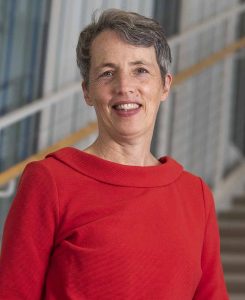Johns Hopkins UniversityEst. 1876
America’s First Research University
By the fall of 2022, CAPABLE, a free program that stands for Community Aging in Place — Advancing Better Living for Elders, had more than 40 sites in 21 states. Today that program has expanded to international sites in Sydney, Australia, and Nova Scotia, Canada.
Through the program, older adults collaborate with a nurse, an occupational therapist, and a handy worker to set actionable goals and modify their housing to age with dignity in their communities. The program has been proven to lower health care costs — roughly $3,000 in program costs saves $30,000 per person in avoided medical costs and nursing home admissions.
As seen in this video produced two years ago, older adults, their families, and the communities in which they live all benefit when people can age in their communities.
The CAPABLE program, which began as a pilot study in the School of Nursing more than a decade ago, is becoming a model for how society can do better to deliver care and well-being to individuals and communities.

The School of Nursing’s new Institute for Policy Solutions aims to shift policy and practice away from sick care toward preventive and whole-person care, and programs like CAPABLE will set the standard for that shift and influence the redesign of the U.S. health system.
Care Synergy, a network of hospice, home health, and palliative care affiliate partners, is now the CAPABLE national hub, charged with growing CAPABLE services nationwide. “Care Synergy’s experience and expertise has expanded CAPABLE to even more locations across the country,” says School of Nursing Dean Sarah Szanton, PhD, RN, FAAN, CAPABLE co-developer.
Care Synergy has partnerships in several states — including Colorado, Connecticut, Massachusetts, and Vermont — that have CAPABLE or plan to implement it using funds from the American Rescue Plan of 2021 or their Medicaid programs. What’s more, AARP recently included CAPABLE in its Long-Term Care Scorecard. A state gets an extra point for “innovation” if they provide CAPABLE.
Szanton and her team realize the program’s policy implications. “CAPABLE improves people’s lives while saving costs. We are working to make it a Medicare benefit so it can reach the millions of older adults who could use it,” she says.
As health care financing is moving toward patient-centered outcomes, satisfaction, and engagement, “CAPABLE is off the charts in terms of that,” Szanton adds. “People love it, it makes them love and trust their health plan and be more engaged in primary care.”
Care Synergy now runs the program from its home base in Colorado. As a result, the state is at the forefront of exciting program developments. The Colorado Visiting Nurses Association, a Care Synergy affiliate, opened three new CAPABLE sites around the state in 2023 and will soon open a fourth.
“We just hired staff,” says Colleen Morton, program manager and registered nurse. “To open a new site, you have to have the people in place, your nurses, occupational therapists, and handymen.”
The Colorado Visiting Nurses Association has been a licensed CAPABLE provider since 2017 and has enrolled more than 650 clients. It recently received a $2.3 million grant from the Colorado Department of Health Care Policy and Financing to support and expand CAPABLE, especially targeting Medicaid beneficiaries. While Colorado won’t be the first state funding CAPABLE through Medicaid, it would be the biggest.
“We get to change lives,” Morton says. “The staff feel honored to be able to work with clients and empower them to be able to stay in their homes.”
An earlier version of this story appeared in the fall 2023 issue of Johns Hopkins Nursing magazine.
Topics: Faculty and Staff, School of Nursing, Fuel Discovery, Strengthening Partnerships